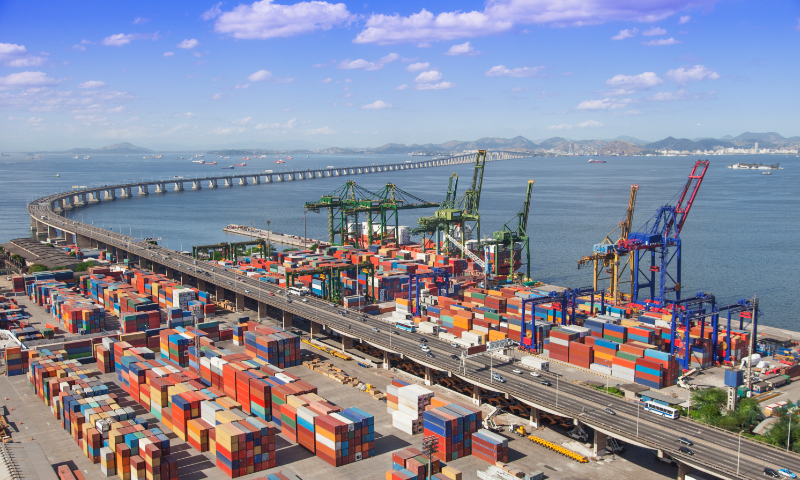
A view of the Port of Rio de Janeiro in Brazil Photo: VCG
Latin America is an indispensable and important participant in the China-proposed Belt and Road Initiative (BRI). In recent years, more and more countries in Latin America and the Caribbean are working with China to advance high-quality BRI cooperation, creating opportunities for an increasing number of local residents.
Against the backdrop, economic and trade exchanges between China and Latin America have entered a phase of accelerated development. Cultural and people-to-people exchanges have yielded fruitful results, and the two sides have strengthened cooperation in infrastructure, green energy, digitalization and other areas.
In 2022, Nicaragua and Argentina joined the BRI, injecting fresh impetus into China-Latin America economic cooperation. So far, 21 Latin American and Caribbean countries have signed BRI cooperation documents with China.
Solid cooperation baseThere is a solid cooperation foundation between China and Latin America. As of 2022, China was Latin America's second-largest trading partner and the largest trading partner of nine other countries in the region - Cuba, Paraguay, Argentina, Chile, Brazil, Uruguay, Peru, Bolivia, and Venezuela, according to statistics from China's General Administration of Customs (GAC).
Even amid the pandemic, the Chinese and Latin American economies showed great resilience, as their total trade volume rose to $450 billion in 2021 and reached a new high of $485.8 billion in 2022. China-Latin America trade has increased 40-fold since 2000, according to GAC data.
There is huge potential for cooperation in investment, infrastructure construction, tourism, and mining, Jiang Shixue, a professor at the Center for Latin American Studies at Shanghai University, told the Global Times.
Chinese businessmen are also actively exploring the Latin American market.
Zhu Qiucheng, CEO of Ningbo New Oriental Electric Industrial Development, told the Global Times that his company is expanding into the Latin American market this year through the partnership with Mercado Libre, a local e-commerce brand.
Xu Xiaolei, marketing manager at China's CYTS Tours Holding Co, told the Global Times that the company will conduct studies in the field of tourism cooperation between China and Honduras, after the two countries established diplomatic relations in March this year.
"The BRI is not only about a single project, it is much more than that. It is an international cooperation platform, a mechanism that can improve social cooperation. China and Brazil can, for example, expand the digital Silk Road," Alessandro Golombiewski Teixeira, former Brazilian minister of tourism and former special presidential economic advisor, told the Global Times in a recent interview.
As for the BRI's development in the region, Teixeira predicted that there would emerge a recognized and developed platform for Latin American cooperation.
"I hope that Brazil will adopt the BRI as one of its international cooperation platforms, and with that can inspire other countries in the region to adopt the initiative, too," he noted.
High-aiming initiativeLatin America has been gearing up to embrace the BRI. And it is a "big possibility" that Brazil will officially join the China-proposed initiative as leaders of both countries are expected to engage more during the planned visit, Teixeira said.
Brazil's President Luiz Inacio Lula da Silva's official visit to China was rescheduled after Lula was diagnosed with a mild case of pneumonia in late March.
In the original plan, Lula was to be accompanied by a delegation of hundreds of businesspersons, alongside governors, congressmen, and government ministers, read a statement by the Brazilian President's office.
"As the two largest developing countries, [cooperation between] Brazil and China would have a very positive impact. They share many key visions. For example, the shared vision of development, reduction of inequality, poverty alleviation, and rural revitalization. These visions that China and Brazil have in common will be the base for future relations," said Teixeira.
In terms of China-Brazil cooperation, Teixeira said that agricultural cooperation in traditional sectors, such as beef and poultry, is very important. The energy sector is yet another example, with cooperation in sectors such as bio-diesel or biofuels. Moreover, Brazil can increase the purchase of Chinese machinery like precision agriculture equipment, and fertilizers, as China is a big producer of green fertilizers such as green ammonia.
Pragmatic cooperation between China and Brazil has made great strides in recent years in the fields of manufacturing, energy, and agricultural infrastructure, and China has been Brazil's top trading partner for 14 consecutive years. In 2022, bilateral trade totaled $171.49 billion, up 4.9 percent year-on-year, according to data from GAC.
Apart from trade, analysts believe that finance will be an important sector for the future of China-Brazil cooperation.
Deepened cooperation between the central banks of China and Brazil will help the performance of Chinese banks in Brazil, said Teixeira.
The central banks of China and Brazil in February signed a memorandum of understanding on establishing yuan clearing arrangements to process bilateral trade in Brazil.
The two countries signed a yuan clearing deal in late March, according to a statement released on March 29 on the website of the Brazilian Trade and Investment Promotion Agency.
Local currency clearing is good for both countries because it will effectively reduce the interest rate cost of using the US dollar as an intermediate currency, Wang Youming, senior research fellow and director of the Department for Developing Countries Studies at the China Institute of International Studies, told the Global Times.
"On settling bilateral trade with the Chinese yuan, I think that could be a good idea. It can diminish volatility and can improve predictability between the two countries. And it would be good not only for trade, but also for investment," said Teixeira.




